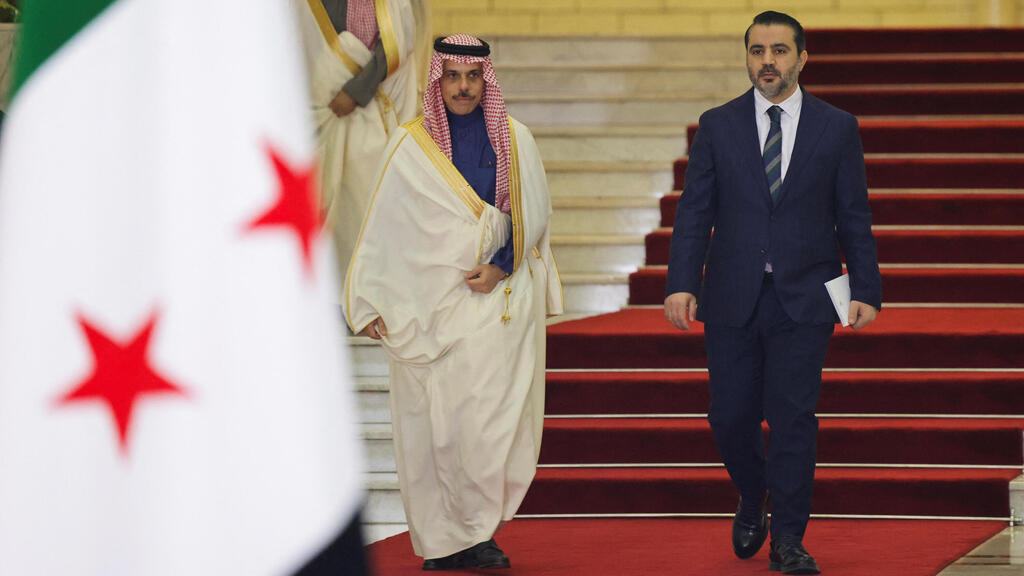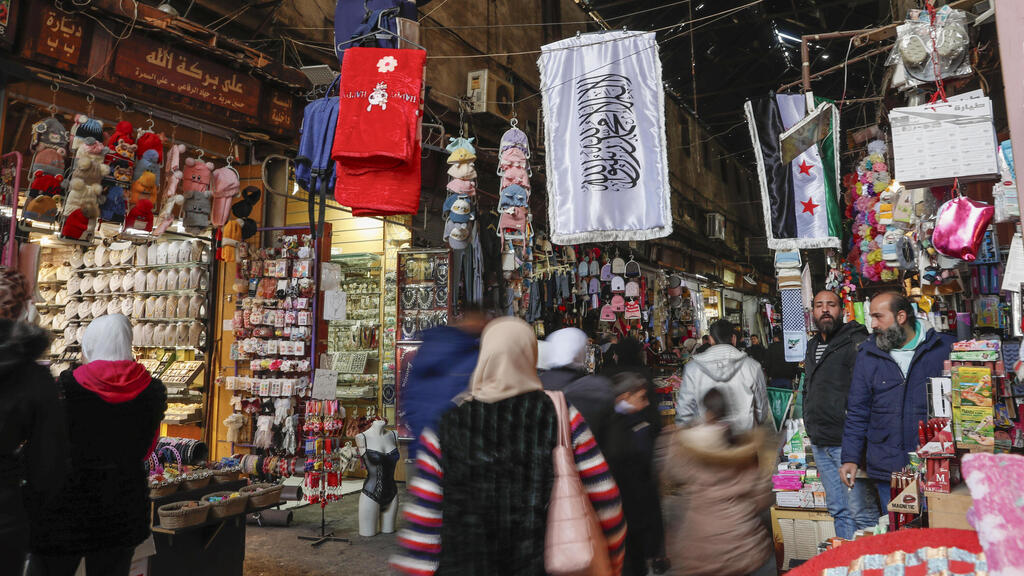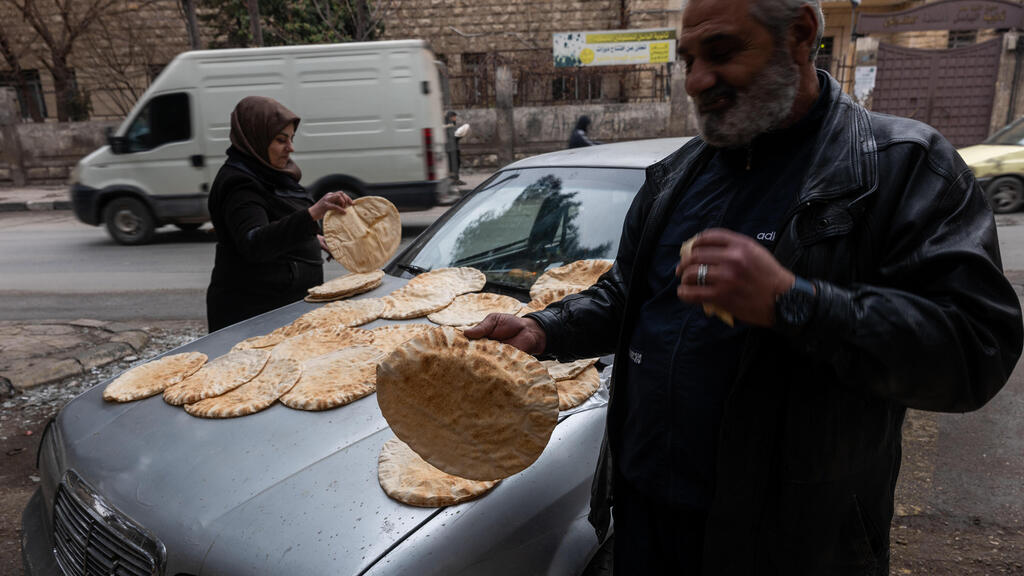Getting your Trinity Audio player ready...
Syria’s new government, led by Ahmad al-Sharaa (who formerly used the nom de guerre Abu Mohammad al-Julani), who played a key role in toppling former President Bashar Assad’s regime, is eagerly awaiting the lifting of international sanctions. The issue has dominated discourse in Syria over the past weeks, including a Friday press conference attended by Syrian Foreign Minister Asaad al-Shibani and his Saudi counterpart, Prince Faisal bin Farhan, who visited the country.
During the conference, the Saudi foreign minister expressed support for Syria's economic recovery and urged the acceleration of sanctions relief. “We are engaging in dialogue with relevant nations and receiving positive signals,” Bin Farhan said. Al-Shibani echoed these sentiments. “We reiterate our call for lifting international sanctions and support opening the doors to investment in Syria," he said.
Despite these appeals, sanctions against Syria remain intact weeks after the regime’s fall. However, significant economic changes are underway. Domestic restrictions imposed by Assad’s government crumbled almost immediately after rebel forces took control, ushering in an unprecedented openness in Syria’s economy.
A new freedom, but at a cost
Under Assad, the regime maintained monopolies over essential goods, fuel and consumer products, restricting access to loyalists and punishing those who sought alternatives. Traders who attempted to import foreign goods or engage in currency exchange faced severe penalties. Some turned to smuggling through Lebanon or paid exorbitant fees to intermediaries connected to the regime to bring goods into the country.
This tightly controlled system began to dissolve soon after the regime’s fall. Speaking with the AFP news agency, Damascus-based trader Yousef Rajab described the dramatic shift. “The day after the regime fell, I brought out all the foreign goods I had stored – imported biscuits, cigarettes, and bottles of shampoo –and displayed them without fear. It was an unfamiliar feeling, but I was very happy,” he said.
However, this newfound economic freedom has also brought disorder. Traders now complain of a lack of regulation in the markets. “There’s trade freedom, but there’s also chaos,” Rajab added.
Get the Ynetnews app on your smartphone: Google Play: https://bit.ly/4eJ37pE | Apple App Store: https://bit.ly/3ZL7iNv
Adnan Suleiman, an economist and professor at Damascus University, explained the underlying issues. “The economic model under the Assad regime was nominally a free market, but it operated with distorted mechanisms. Instead of competition, there was monopoly,” Suleiman said. The emerging model, he noted, is still in flux, resembling the old system without its restrictions. In the absence of controls, chaos has taken root.
4 View gallery


Syrian Foreign Minister Asaad al-Shibani and his Saudi counterpart Faisal bin Farhan in Damascus
(Photo: Reuters)
This is evident in the streets of Damascus, where money changers now openly advertise their services, a practice that previously carried the risk of seven years in prison and heavy fines.
Undoing old contracts
Despite Assad’s overthrow, Syria faces a long road to economic recovery. Numerous contracts and agreements tied to the former regime remain in place and must be dismantled. These deals often benefited the regime’s inner circle and aligned with the interests of the Shiite axis.
One prominent company under scrutiny is the Al-Qatirji Group, a major enterprise closely associated with Assad. Last week, the newly appointed governor of Syria’s central bank, Maysa Sabreen, issued a directive freezing all accounts linked to Al-Qatirji and other entities tied to the former regime.
Al-Qatirji’s activities have long drawn attention. The company was previously sanctioned by Western nations and frequently appeared in reports during the war, often connected to allegations of smuggling oil and Captagon, an illicit drug. In July 2024, a vehicle associated with Al-Qatirji was reportedly targeted in an Israeli strike on the Damascus-Beirut highway, killing prominent businessman Mohammed Braa al-Qatirji.
The Al-Qatirji Group’s involvement extends beyond domestic affairs. Last week, Syria’s state-owned Al-Watan newspaper reported the cancellation of a 2019 investment agreement with the Russian company Stroytransgaz regarding the Tartus commercial port. The agreement, signed under Assad’s regime, had granted the company operational control for 49 years, extendable by another 25 unless either party objected.
According to an analysis in Asharq Al-Awsat, the port investment was tied to Russia’s military presence at its nearby Tartus base. A Russian source told the paper that Stroytransgaz, a private company with equal shares held by Russian and Syrian partners, was linked to the Al-Qatirji Group. The source described the cancellation as inevitable, part of a broader effort to revoke contracts that enriched regime cronies under the guise of state projects.
The source added that this decision reflects a logical approach toward private companies involved in corruption under the previous regime. “It is clear that many companies established to enrich Assad’s allies will either cease operations or see their profits redirected to serve the public interest,” the source said.
While Assad’s regime has fallen, Syria’s economic transformation is far from complete. The nation must navigate the challenges of rebuilding its institutions, undoing the remnants of a corrupt system, and restoring trust in its economic framework. For now, Syria remains caught between newfound freedom and the uncertainty of a fragile transition.






